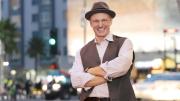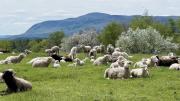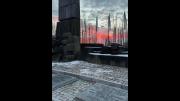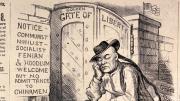How will Americans know that their Supreme Court is truly dedicated to interpreting the Constitution as the Founding Fathers would wish? Attorney, activist, and author Phyllis Schlafly, A.M. ’45, offered some guidelines while discussing “The Culture War in the Courts” on October 15 as part of the 2007-2008 Dean’s Lecture Series at the Radcliffe Institute for Advanced Study. Homeowners won’t face seizure of their property by municipalities eagerly seeking to increase the local tax base, she said. “Unborn babies” will be entitled to protection under the Fourteenth Amendment, while gun-control laws and federal funding of K-12 education will be abandoned. And public-school students will spend more time saying prayers than learning how to use a condom.
A polished, impeccably prepared speaker, Schlafly provided a torrent of legal references, snappy comments, and vivid anecdotes to make her case to an audience of roughly 150, including Radcliffe’s interim dean, Higgins professor of natural sciences Barbara J. Grosz, and former dean, Harvard president Drew Faust. The presentation drew on research and arguments Schlafly has amassed in 41 years of writing a monthly newsletter and 35 years of leading the Eagle Forum, a national organization of “citizens who participate in public policymaking as volunteers” (see “Two Women, Two Histories,” November-December 2007, page 29). She began by invoking Hamilton and Lincoln—the former’s view that the courts would be the least dangerous branch of government because Congress holds all legislative power and assigns their jurisdictions, and the latter’s assertion, after the Dred Scott decision of 1857, that the Supreme Court cannot be allowed to set the law.
“Activist” judges who see the Constitution as a “living document” have used that claim incrementally to take away the supremacy of the people, she charged. Thus the Fifth Amendment prohibition against governmental seizure of private property except for public “use” was sufficiently diluted by a 50-year-old judicial wording shift to public “purpose” that in 2005 a Supreme Court majority could allow New London, Connecticut, to seize homes to make way for a business venture that might generate more taxes. She provided similar examples, in her speech and in reply to subsequent questions, covering other areas of concern to her: parental rights, pornography, religious freedom, and homosexuality. Her comments on the latter prompted a small group of people to walk out.
Schlafly argued that the nation needs judges for the same reason baseball needs umpires—jurists who call the balls and strikes, but don’t change the rules of the game. She praised Justice Clarence Thomas for setting the proper example, and said citizens must strive for judicial appointees who represent the ideal expressed almost 800 years ago in the Magna Carta, a forerunner of the Constitution: individuals who “know the law of the realm and are minded to keep it well.” (Video coverage of the lecture appears at www.radcliffe.edu/events/lectures/2007_schlafly.php.)








